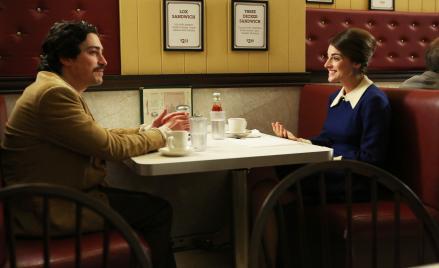Seth, Paul:
I would characterize Mad Men’s oblique way of handling the MLK assassination—what you called “small,” Seth—as pretty brave, mostly because it’s probably closer to the truth about how white people reacted. When they heard the news, most of the show’s characters felt unsettled and even devastated. But they were not so much upset about the assassination as about the general feeling of things falling apart. There was a sense of apocalypse in the air, but it was about the mood more than the event. (The kind of mood that opens the door to a scattering of weird, Twilight Zone-y prophet types—Pete, the insurance guy, the apes, and the many references to the biblical Noah.)
In fact, this show was as much about real estate as it was about race riots. The episode opens on an extended shot of Peggy’s back as she looks out a window—the window of her possible new apartment. And soon we are at the ad awards (which by the way happened pretty much exactly like that, down to the Paul Newman speech), everyone grumbles about how far back their table is. Peggy’s happy moment—her daydreams of hauling lumber to the Upper West Side, populating sketchy neighborhoods with little Peggy/Abelets, is just the first seed of gentrification. Yes, she is happy about her future domestic bliss—but she’s also relieved, because Abe has, with his radical, edgy vision, provided the game plan for the white people to regain control of their city. “We’re forgetting what Tecumseh said,” weirdo insurance guy proclaimed. Tecumseh said that land couldn’t be sold, any more than air or water. So much for that. Heya howa howa howa.
Michael’s father says people need each other in a crisis, but people also become a distilled version of themselves, as if you can suddenly see the naked truth about what really matters to them (Anyone remember the near-plane crash scene in Almost Famous)? In this case, the good guys and the bad guys switched places. Pete talked about shame and tragedy, while Harry was worried about episodes of Bewitched being interrupted for news updates (Harry’s version of real estate is air time). Henry Francis too showed his ugly side, although not in quite so obvious a way. The riots have stoked his political ambitions, but for all the wrong reasons. His complaints about Mayor Lindsay “negotiating with hoodlums,” smiling like he was at a pancake breakfast—that’s a future petty Republican talking. In fact what Mayor Lindsay did that night was unusually ballsy—he left his Broadway show and headed straight to Harlem, helped avert riots in New York just by showing up and talking to people on the streets. (Here is a great clip of Lindsay talking about that night, from archives of the Museum of the City of New York.)
Maybe if we follow Francis through his campaign for state Senate, we will finally come to understand what he sees in Betty. (“I can’t wait for people to really meet you,” he says. Really? Her?) All this time I’ve been thinking Henry willfully ignores the ugly sides of Betty because he loves her so, sweet guy, but maybe they are more similar than we realize—petty, suburban, interested in keeping the wallpaper lined up.
By this crisis calculation, Don is the last honest man standing. Unlike in the earlier episodes, he is not stumbling around blindly. Unlike everyone else around him, he sees himself clearly and he understands what’s important to him. He does not care about a race vigil. He doesn’t care about Betty’s rules. He doesn’t even so much care about his children, as he confesses in that heartbreaking speech. He cares about Sylvia getting trampled in D.C., and about Bobby, for a brief moment, until Bobby says the wrong thing.
Everyone remembers Noah as the hero of the Flood. But he isn’t. That section of Genesis ends with Noah drunk, alone in his tent, and betrayed by his son on whom he, also, takes petty revenge with a few cutting words—a revenge that is interpreted to lead to slavery and the opening of the war with the Canaanites. Yes, Seth, it’s bold of the show to turn a sexy icon into a figure of pity and ridicule. But it’s been done before.
Gentlemen, tonight will not be the night.
Hanna
